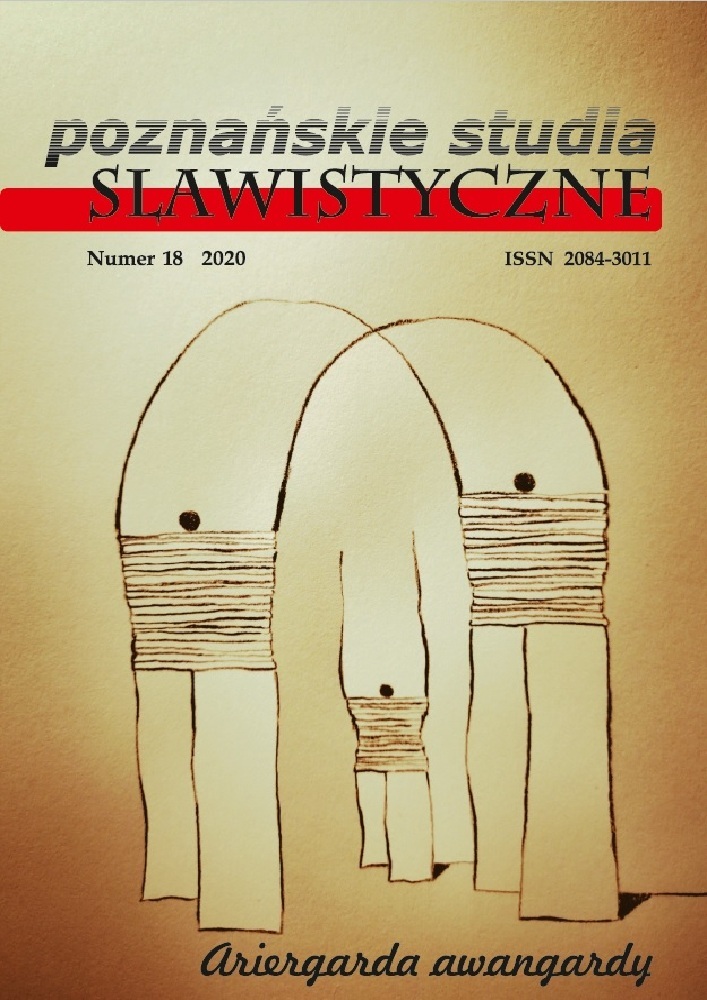Abstract
Thanks to the work of Pascale Casanova, Franco Moretti, David Damrosch and many others, over the past two decades, the concept of world literature has once again become the subject of thorough examination within the field of literary studies, especially in relation to cosmopolitanism and globalization. When it comes to the study of individual national literatures and specific regional contexts, as well as to the definition of comparative literature as a discipline, debates regarding its background, its reach and limitations could not be ignored. World literature thus appears as a heterogenous entity – always manifesting in different contexts in different forms – consistently in dialogical exchange with specificities of a particular literature and culture. Instead of discussing the problematic relation between centre and periphery or criticizing the idea of global literary and cultural canon, the avant-garde as an international and global phenomenon that appears even more radically on the so-called periphery is what is of primary interest to me. Therefore, the purpose of this paper is to demonstrate that avant-garde (in its various forms and radical expressions) simultaneously challenges art as an institution and introduces the idea of a decentred geography of world literature.
References
Arac, J. (2002). Anglo-Globalism?. “New Left Review” vol. 2, no. 16.
Braudel, F. (1992). Civilization and Capitalism: 15th–18th Century: The Perspective of the World. Vol 3. Trans. S.
Reynolds. Berkley: University of California Press.
Bürger, P. (1984). Theory of the Avant-garde. Minneapolis: University of Minnesota Press.
Casanova, P. (2004). The World Republic of Letters. Cambridge Massachusetts: Harvard University Press.
Damrosch, D. (2003a). World Literature, National Contexts. “Modern Philology” vol. 100, no. 4, pp. 512–531. https://doi.org/10.1086/379981.
Damrosch, D. (2003b). What is World Literature? New Jersey: Princeton University Press. https://doi.org/10.1515/9780691188645.
Doorman, M. (2003). Art in Progress: APhilosophical Response to the End of the Avant-garde. Amsterdam: Amsterdam University Press. https://doi.org/10.5117/9789053565858.
Even-Zohar I. (1990). Laws of Literary Interference. “Poetics Today”, pp. 54–62.
Glisic, I., Vujosevic, T. (2016). I am Barbarogenius: Yugoslav Zenitism of the 1920s and the Limits of Performativity. “Slavic and East European Journal” vol. 60, no. 4, pp. 718–743.
Joyeux-Prunel, B. (2015). Provincializing Paris. The Centre-Periphery Narrative of Modern Art in Light of Quantitative and Transnational Approaches. “Artl@s Bulletin” vol. 4, no. 1, pp. 40–64.
Joyeux-Prunel, B. (2018). Peripheral Circulations, Transient Centralities: The International Geography of the Avant-gardes in the Interwar Period (1918–1940). “Visual Resources”. https://doi.org/10.1080/01973762.2018.1476013.
Klobucka, A. (1997). Theorizing the European Periphery. “Symploke” vol. 5, no. 1/2 pp. 119–135. https://doi.org/10.1353/sym.2005.0061.
Koselleck, R. (2004). Futures Past: On the Semantics of Historical Time. Trans. K. ¬Tribe. New York: Columbia University Press.
Mansbach, S.A. (1990). From Leningrad to Ljubljana: The Supressed Avant-gardes of East-Central and Eastern Europe during the Early Twentieth Century. “Art Journal” vol. 49, no. 1, pp. 7–8. https://doi.org/10.2307/777174, https://doi.org/10.1080/00043249.1990.10792661.
Marinetti, F.T. (2009). The Founding and Manifesto of Futurism. In: Futurism: An Anthology. Eds L. Rainey, Ch.
Poggi, L. Wittman, New Haven–London: Yale University Press.
Moretti, F. (1998). Atlas of the European Novel 1800–1900. London–New York: Verso.
Moretti, F. (2000). Conjectures on World Literature. “New Left Review” no 1, pp. 54–68.
Moretti, F. (2013). More Conjectures. Distant Reading. London–New York: Verso.
Murphy, R. (2004). Theorizing the Avant-garde: Modernism, Expressionism and the Problem of Postmodernity. Cambridge: Cambridge University Press.
Petrusewicz, M. (2019). Rethinking Centre and Periphery in Historical Analysis: Land-based Modernization as an Alternative Model from the Peripheries. In: Re-Mapping Centre and Periphery: Asymmetrical Encounters in European and Global Contexts. Eds T. Hauswedel, A. Körner, U. Tiedau, London: UCL Press. https://doi.org/10.2307/j.ctv550cmg.4.
Pizer, J. (2012). Johann Wolfgang von Goethe: Origins and Relevance of Weltliteratur. In: The Routledge Companion to World Literature. Eds T. D’haen, D. Damrosch, D. Kadir. Routledge: London–New York.
Puchner, M. (2005). Poetry of the Revolution: Marx, Manifestoes and the Avant-garde. Princeton–Oxford: Princeton University Press. https://doi.org/10.1515/9781400844128.
Roberts, J. 2015, Revolutionary Time and the Avant-garde. London: Verso.
Rosendahl Thomsen, M. (2008). Mapping World Literature: International Canonization and Transnational Literatures. London–New York: Continuum.
Rosendahl Thomsen, M. (2012). Franco Moretti and the Global Wave of Novel. The Routledge Companion to
World Literature. Eds. T. D’haen, D. Damrosch, D. Kadir. London–New York: Routledge.
Subotić, I. (1990a). Zenit and Zenitism. “The Journal of Decorative and Propaganda Arts” vol. 17, pp. 14–25. https://doi.org/10.2307/1504074.
Subotić, I. (1990b). Avant-garde Tendencies in Yugoslavia” “Art Journal” vol. 49, no. 1, special issue: From Leningrad to Ljubljana: The Supressed Avant-gardes of East-Central and Eastern Europe during the Early Twentieth Century, pp. 21–27. https://doi.org/10.2307/777174.
Szabolcsi, M. (1971). Avant-garde, Neo-avant-garde, Modernism: Questions and Suggestions. “New Literary History” vol. 3, no. 1, pp.49–70. https://doi.org/10.2307/468380.
Šimičić, D. (2003). From Zenit to Mental Space: Avant-garde, Neo-avant-garde, and Post-avant-garde: Magazines and Books in Yugoslavia, 1921–1987. In: Impossible Histories: Historical Avant-gardes, Neo-avant-gardes and Post-avant-gardes in Yugoslavia, 1981–1991. Eds D. Djurić, M. Šuvaković. Cambridge–London: MIT Press.
Terlouw, K. (2003). Semiperipheral Developments: From World-Systems to Regions. “Capitalism Nature Socialism” vol. 4, no. 14, pp. 71–90. https://doi.org/10.1080/10455750308565547.
License
Copyright (c) 2020 Zrinka Božić Blanuša

This work is licensed under a Creative Commons Attribution-NoDerivatives 4.0 International License.

